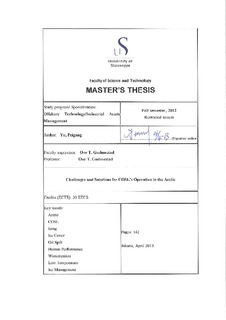Challenges and solutions for COSL's operation in the Arctic
Master thesis
Permanent lenke
http://hdl.handle.net/11250/183178Utgivelsesdato
2013Metadata
Vis full innførselSamlinger
Sammendrag
The enormous oil and gas fields located in the Arctic region, has given this area the name “Middle East No. 2”. Due to limited experience and availability of technology/facilities which can withstand severe environmental conditions, the oil and gas exploration and production in this region are, however, not carried out quickly.
Recently, the rapid increase in oil price and decrease in the recoverable oil volumes worldwide have driven the focus of the oil companies to the Arctic. In addition, the advancement of technology and equipment has made the oil and gas production in this region more feasible and cost-effective than in the earlier time. The combination of extreme low temperature, icing, permafrost and icebergs, extreme weather caused by the Polar Lows, vulnerable biological environment, strict environmental regulation, unreliable logistics support and insufficient infrastructure has resulted in huge challenge for the safety and efficiency of the oil and gas operation in the Arctic.
China Oilfield Services Limited (COSL) owns a most complete oil service chains such as a large number of drilling units; jack-up rigs and semi-submersible platforms, seismic service vessels, supply boat service and multiple kinds of oil field technology services. Aiming to be a leading energy services company, COSL has decided to extend their oil service market into the Arctic region. However, the coldest operational region for COSL is currently located in Bohai Bay and they have adopted the solution of moving away from the ice. COSL has also been experiencing extreme weather, such as hurricanes, which occurs frequently in the South China Sea. Due to their geographical location, i.e. far away from the Arctic region, and the limited company strategy in deep water service, COSL has not yet started research activities in the Arctic region. In order to obtain greater knowledge about the Arctic region, the author of this thesis had been given the opportunities by COSL to complete his Master Degree in Offshore Technology, specialized in Industrial Asset Management, at University of Stavanger (UIS) for one year. It is well known that Norway, which is located just south of the Arctic region, has accumulated abundant experience of operations in the Arctic area.
As Professor Ove T. Gudmestad is an expert in research related to the Arctic region, the author decided to take this opportunity to work on the topic for his thesis with his guidance and supervision. With reference to the company’s existing operation mode, experience in the Arctic and COSL’s operation capability, this thesis presents a gap analysis and a risk assessment related to work in the Arctic by taking the human performance and emergency response to oil spill in the Arctic as examples for discussion. In order to help COSL in starting the preparation for working in the Arctic, this thesis proposes some suggestions regarding drilling rigs construction, personnel training, and oil field technology improvement.
Beskrivelse
Master's thesis in Offshore technology
